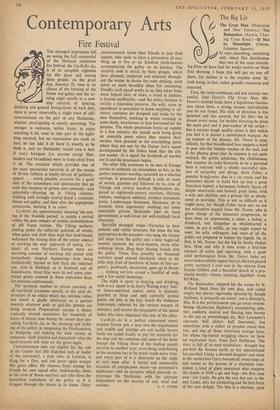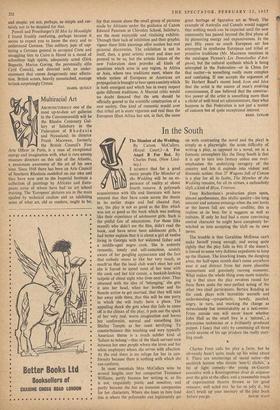The Big Lie
IT says something, something odd, about film distribution that two of the most interest- ing films we have had for weeks receive no West End showing. I hope this will put no one off them, for neither is in the smallest sense `B,' both being, in fact, rather grandly conceived and executed.
First, the more ambitious and less entirely suc- cessful, Jose Ferrer's The Great Man. Mr.
Ferrer's skeletal looks have a lugubrious fascina- tion about them, a strong, laconic individuality you do not forget. His style of direction is less personal and less assured, but his film—his in almost every sense, for besides directing he plays the main part and is part-author of the script— has a curious tough quality about it that makes you feel it is almost a masterpiece manqué. As an exposer of the phoney, Mr. Ferrer is mag- nificent, for that bloodhound face suggests a mind to peer into the bottom reaches of the soul, and if the phoney great man he exposes is not quite realised, the public adulation, the childishness, that requires its radio favourite to be a personal hero is satirised with a wholly successful mix- ture of sympathy and shrugs. Herb Fuller, a popular broadcaster, dies in a car crash, and his promoters decide to build him up into a great American legend, a homespun fatherly figure, all simple wisecracks and homely good cheer, with a wife and children and a private life as whole- some as porridge. This is not as difficult as it might seem, for though Fuller turns out, on not too exhaustive inquiry from Mr. Ferrer, who is given charge of the memorial programme, to have been an opportunist, a cheat, a lecher, a drunkard, and altogether as wholehearted a rotter, to put it mildly, as you might expect to meet, his wife, colleagues, and most of all the public are prepared to bolster the legend. So, at first, is Mr. Ferrer, but the big lie finally chokes him. How and why it does make a first-rate mixture of satire and reporting, with a good solid performance from Mr. Ferrer (who yet never makes solidity appear heavy), the best-played pretty secretary I ever saw in the cinema from Joanne Gilbert, and a beautiful sketch of a pro- vincial worthy—funny, touching, dignified—from Ed Winn.
The Rainmaker, adapted for the screen by N. Richard Nash from his own play, and rather stagily but always vigorously directed by Joseph Anthony, is primarily an actors', not a director's, film. It is the performances you go away remem- bering—Katharine Hepburn's smouldering spin- ster, suddenly desired and flaming into beauty as she can so astonishingly do; Burt Lancaster's con-man, half slicker, half buccaneer, but sometimes with a slither of prophet about him too; and one of those American teenage boys, for whose big-footed wriggling charm we have no equivalent here, from Earl Holliman. The story is full of an easy symbolism : drought has parched the Kansas earth, as her spinsterhood has parched Lizzie, a devoted daughter and sister in the motherless Curry household where hope at last conies in the person of a charlatan rain- maker, a kind of gipsy spaceman who conjures the clouds at $100 a go and begs—the first man ever—for Lizzie. He gets the rain but not, in the end, Lizzie, only her awakening and the first force of her new delight. The film is a charmer, pure
and simple; yet not, perhaps, so simple and cer- tainly not to be despised for that.
Powell and Pressburger's Ill Met by Moonlight I found frankly confusing, perhaps because it seems to expect you to know the story and to understand German. This military jape of cap- turing a German general in occupied Crete and smuggling him to Cairo is filmed in a mood of schoolboy high spirits, adequately acted (Dirk Bogarde, Marius Goring, the perennially elfin Cyril Cusack), and directed with an under- statement that comes dangerously near affecta- tion. British actors, heavily moustached, manage to look surprisingly Cretan.
ISABEL QUIGLY



































 Previous page
Previous page